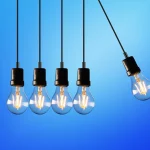How can gas shortages and extremely high energy prices be dealt with?
Gas and electricity are currently causing major problems for many companies. In the worst case, the situation is already threatening the existence of some companies. Therefore, the consultants at Kloepfel Consulting are keeping a very close eye on what’s happening. At the same time, thanks to many years of experience, they develop measures for dealing with complex challenges. Thus, if necessary, Kloepfel Group can name alternatives, put together a package of measures and offer real help.
Current situation, general conditions

The current crisis clearly shows the special importance of gas supply in the supply chain. Due to the restrictions caused by the war in Ukraine and high energy prices, there are now problems and there is great uncertainty.
Costs are skyrocketing and the supply situation for the coming winter months seems fundamentally uncertain. Electricity prices alone have reached record levels and are currently around ten times higher on the spot market than they were at the beginning of 2021.
There are correlations here between the war in Ukraine, gas prices and electricity prices, as becomes clear when looking at corresponding charts with prices over time.
It is now important to remember that gas is also used on a large scale for electricity generation. Thus, with the increased gas price, the production costs for electricity generation increase. Consequently, the gas price has an impact on the overall price on the electricity market.
Regarding the situation in Germany, the Federal Network Agency states in its report dated August 26 in 2022 that the situation is tense and that a further deterioration cannot be ruled out. Further, the Federal Ministry of Economics writes: “Companies and private consumers must prepare for significantly rising gas prices.”
Companies are therefore under massive pressure, especially if they have not yet stocked up for next year or negotiated contracts for gas and electricity supplies.
Gas supply in companies and supply chains
So, this is about the importance of gas supply in the supply chain and the associated hazards and risks. In doing so, the following question needs to be answered for general understanding: “Where is gas basically used in industry?”
Roughly, some talk about energy use and material use of gas. Somewhat more precisely, four possibilities for the use of gas in industry emerge.
First, gas is used to produce electricity. Secondly, gas is used for heat production, i.e. for heating work rooms, for example. Third, gas is used to generate process heat. This is very important, because process heat is needed in production, for example, for melting. Basically, process heat is needed whenever heat is required to carry out the production process at all. Fourth, gas is also used in the products themselves; the chemical industry in particular is worth mentioning here.
Basically, it should be noted that production plants in industry usually run continuously. They cannot simply be shut down in between, just because a raw material or the electricity is missing.
Alternatives

This raises the question of alternatives to gas. Do they exist at all? At the same time, companies must consider the time and cost frame in which they can switch to alternatives.
In some cases, it is possible to use a different raw material instead of gas for energy purposes. For example, some companies have so-called dual-fuel plants for energy production. These are prepared in such a way that they can be converted to oil, for example. Heating with oil instead of gas is then possible, for example.
In the event of an unstable energy supply, emergency generators can sometimes help. With them it is possible to bridge temporary power cuts.
However, both alternative raw materials and equipment such as emergency generators must be procured. In the current situation, this is a major challenge for any purchaser.
Measures, help from Kloepfel Group
So how can this be remedied? First of all, it is helpful to know and understand the situation and its effects on the respective company. Already here the consultants of Kloepfel Group can help. Because at Kloepfel, relevant market developments are continuously observed across all industries. In addition, there is an intensive understanding of the supply chains.
Thus, Kloepfel’s consultants make a precise risk analysis along the supply chain. In doing so, they use their know-how to look deep into the company’s supply chain. They look at every product group and the respective manufacturing process. They also ask in which country the manufacturing takes place. In some countries there are no problems. Here in Western Europe, however, action must then be taken regarding gas supply and electricity. At least one should ask whether the supplier can ensure the supply – for raw materials, for materials etc.
In general, warehousing is currently the top priority. So, one important measure is to increase stocks. This concerns the respective company itself as well as its suppliers. Here, Kloepfel Group can relieve the purchasing department by having the consultants negotiate with the suppliers as “temporary colleagues”, especially regarding quantities and prices, etc.
Approaches and measures, not only to secure the gas supply, but overall to avoid the interruption of the supply chain, can be developed by Kloepfel consultants and implemented in the team.
Checklist against gas shortages
- Convert secondary fuel system from gas to oil.
- Procure emergency generators.
- Purchase and stockpile oil or diesel for existing and new emergency generators.
- Convert cogeneration plants from gas to oil.
- Convert gas-fired power plants from LNG to LPG.
- Place LNG tank on plant site to ensure supply.
- Cooperate and support each other with neighboring companies (heat, energy, LPG, etc.).
- Expand solar panels.
- Consider wind turbines on plant site.
- Screen supply chain and examine risks with (upstream) suppliers due to gas shortages.
- Source alternatives to (upstream) suppliers with gas shortages.
- Stock up on material affected by gas shortages to avoid production losses.
- Have energy saving measures checked.
Kloepfel Consulting will be pleased to advise you. Take advantage of a free initial consultation.
Contact:
Kloepfel Group
Christopher Willson
Tel.: 0211 941 984 33
Pempelforter Str. 50
40211 Duesseldorf
Mail: rendite@kloepfel-consulting.com
